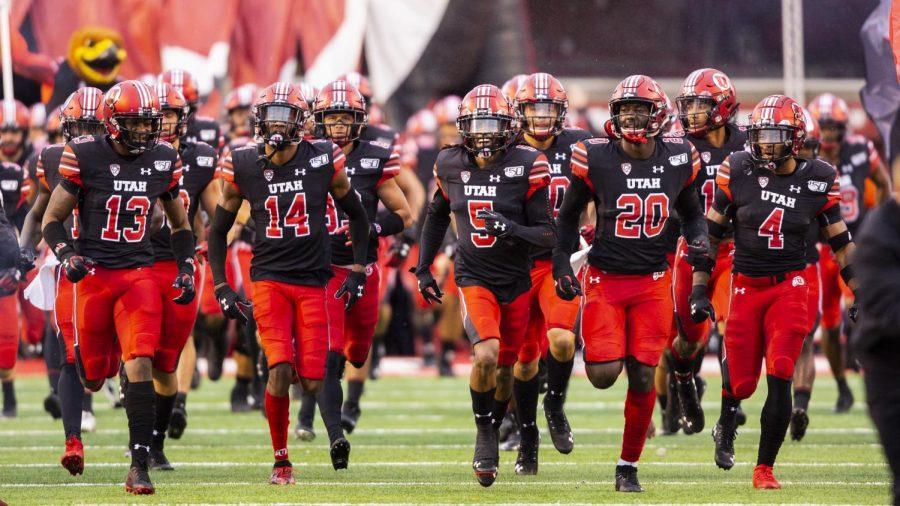McGrath: Football Season Is Off – So Pac-12 Teams Have Time to Make Changes
The University of Utah Football team charge onto the field in an NCAA Football game vs. Arizona State University at Rice-Eccles Stadium in Salt Lake City, UT on Saturday October 19, 2019.(Photo by Curtis Lin | Daily Utah Chronicle)
August 12, 2020
Both the Big Ten and Pac-12 athletic conferences announced this week that they would cancel their fall football seasons due to the coronavirus pandemic. Prior to those decisions, though, and amid nationwide protests against racism and police brutality, student athletes spoke out about their concerns. Using #WeAreUnited, Pac-12 players started a movement to boycott games and the conference if their demands for COVID-19 support and schedule changes, pay and racial justice aren’t met. Twenty and counting University of Utah football players have shown their support and joined the movement over Twitter. Universities’ love of money and sports leads to the exploitation of college athletes for entertainment. As a Pac-12 school, the University of Utah owes its players a response and change of behavior pertaining to the #WeAreUnited movement.
One of the #WeAreUnited players’ major demands is that the Pac-12 “drastically [reduce] excessive pay to Larry Scott, administrators, and coaches.” Excessive pay is correct – in 2019, the U’s football coach, Kyle Whittingham, signed a five-year contract for $22 million. Coaches receive extravagant amounts of cash to run athletic teams, while tenured professors make an average of less than $105k and players make nothing. That’s completely unfair. The U’s athletic department made more than $99.5 million in the 2019 school year, primarily thanks to the players. From a business perspective, these athletes are essentially working for the university. An NCAA student-athlete survey found that football players spent an average of 45 hours on athletics alone each week – not including travel time to and from games. That’s more than the equivalent of a full-time job, without benefits or compensation.
Not only are players not compensated for their work, but they are also unable to be treated like the impressive, famous athletes they are due to Name, Image, and Likeness Rights and Representation rules. According to the NCAA, “Division I student-athletes may not promote or endorse a commercial product or service, even if they are not paid to participate in the activity.” The NCAA does offer students a monitored and limited right to their own name and image based on their university’s limitations and with the association’s approval. The #WeAreUnited statement directly addresses this by asking for the freedom to receive and earn money from the use of their own name and image. It also makes an important connection between that issue and the Black Lives Matter movement, noting that “unjust rules prevent the 98% of college football and basketball players who won’t go pro from capitalizing economically on what would otherwise be the most valuable years of our lives, including many Black players from low-income homes.”
We are obsessed with amateurism when it comes to college sports, so universities get away with not paying athletes for their work to expand schools’ funds and reputations. And while playing amid a pandemic is no longer a concern (at least for now), the demands of #WeAreUnited are still necessary and relevant in calling attention to issues college athletes have always faced. These players deserve not only safety but basic compensation for playing university-sponsored games that directly benefit those institutions. This fall, while the traditional season is postponed, the U and other Pac-12 schools should take a step back and reevaluate their treatment of football players and other student-athletes.







